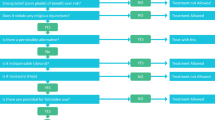Abstract
The aim of the present paper is to reinforce some of the affirmations made by Vera Lucia Raposo in a recent paper published by the Journal of Bioethical Inquiry. According to her, germline gene editing does not violate human dignity at all. This article offers some complementary ideas supporting her statement. In particular, four main arguments are stressed. Firstly, not only is the idea of human dignity unclear, but the idea of the human genome suffers from a general lack of concreteness, which has dramatic consequences for the debate. Secondly, it is highlighted that if we believe that the immutability of the human genome underpins human dignity, then it should be our duty to use the tools of genetic modification to reverse any accidental changes that occur in nature. Thirdly, it is showed that if the alteration of germline constitutes an attack on human dignity, then we should also refrain from performing medical practices such as chemotherapy, which cause precisely this effect. Finally, we argue that modification of germline is not contrary to human dignity but an excellent expression of our autonomy.
Similar content being viewed by others
Notes
In the context of this text, this term refers to the edition of human germline genome.
In the text, this term refers to all possible genetic variations of the human species.
References
Costam, D. B. 2019. Comment on “Human dignity and gene editing”. EMBO reports 20: e47220.
De Miguel Beriain, I. 2018. Human dignity and gene editing. EMBO Reports 19(10): e46789.
———. 2019a. Should human germ line editing be allowed? Some suggestions on the basis of the existing regulatory framework. Bioethics 33(1): 105-111.
———. 2019b. Response by the Author. EMBO reports 20: e47346.
De Miguel Beriain, I. and A. Marcos del Cano. 2018. Gene editing in human embryos. A comment on the ethical issues involved. In The ethics of reproductive genetics. Between utility, principles, and virtues, edited by M. Soniewicka, 173-187. Springer.
Ereshefsky, M. 2010. What’s wrong with the new biological essentialism. Philosophy of Science 77(5): 674-685.
Habermas, J. 2003. The future of human nature. Malden: Polity.
Isasi, R., E. Kleiderman, and B. M. Knoppers. 2016. Editing policy to fit the genome? Science 22: 337-339.
Kass, L. R. 2004. Life, liberty and the defense of dignity. San Francisco: Encounter Books.
Macklin, R. 2003. Dignity is a useless concept. British Medical Journal 327: 1419-1420.
National Academies of Sciences, Engineering, and Medicine 2017. Human genome editing: Science, ethics, and governance. Washington, DC: The National Academies Press.
Raposo, V. L. 2019. Gene editing, the mystic threat to human dignity. Journal of Bioethical Inquiry 16(2): 249-257.
———. 2016. The convention of human rights and biomedicine revisited: Critical assessment. The International Journal of Human Rights 20(8): 1277–1294.
Rifkin, J. 1983. Algeny. New York: Viking.
Acknowledgements
Iñigo de Miguel Beriain’s work was supported by the Government of the Basque Country, Grant IT-1066-16 and the EU Commission, H2020 SWAFS Programme, PANELFIT Project, research grant number 788039.
Funding
Iñigo de Miguel Beriain’s work was supported by the Government of the Basque Country, Grant IT-1066-16 and the EU Commission, H2020 SWAFS Programme, PANELFIT Project, research grant number 788039.
Author information
Authors and Affiliations
Corresponding author
Additional information
Publisher’s Note
Springer Nature remains neutral with regard to jurisdictional claims in published maps and institutional affiliations.
Rights and permissions
About this article
Cite this article
de Miguel Beriain, I., Sanz, B. Human Dignity and Gene Editing: Additional Support for Raposo’s Arguments. Bioethical Inquiry 17, 165–168 (2020). https://doi.org/10.1007/s11673-020-09969-8
Received:
Accepted:
Published:
Issue Date:
DOI: https://doi.org/10.1007/s11673-020-09969-8



